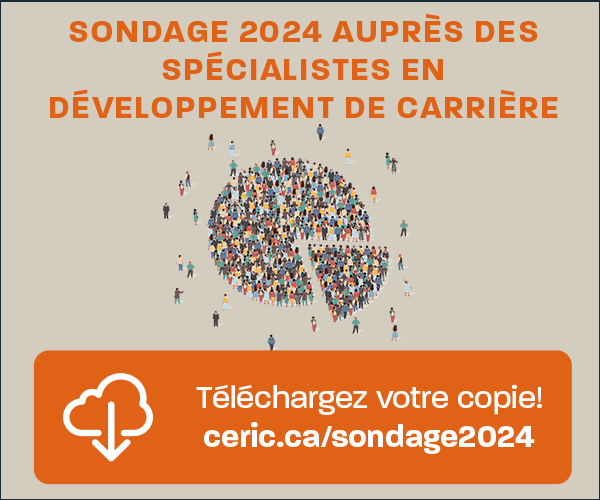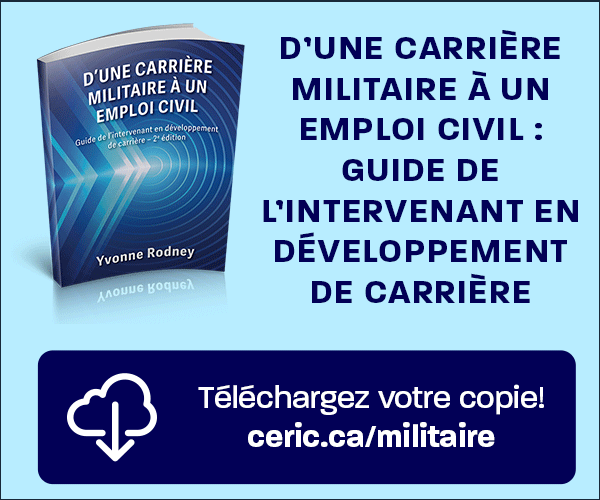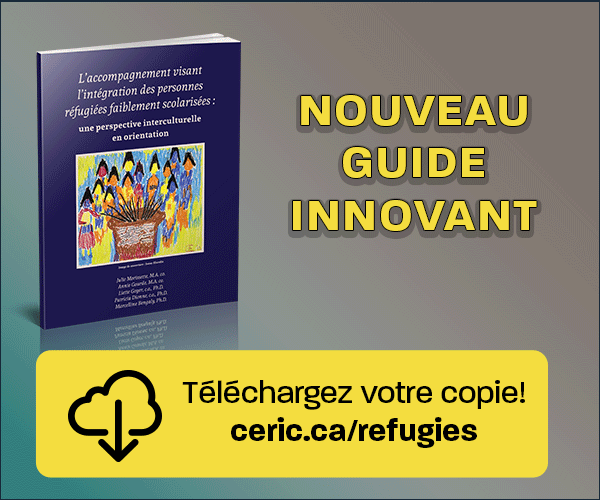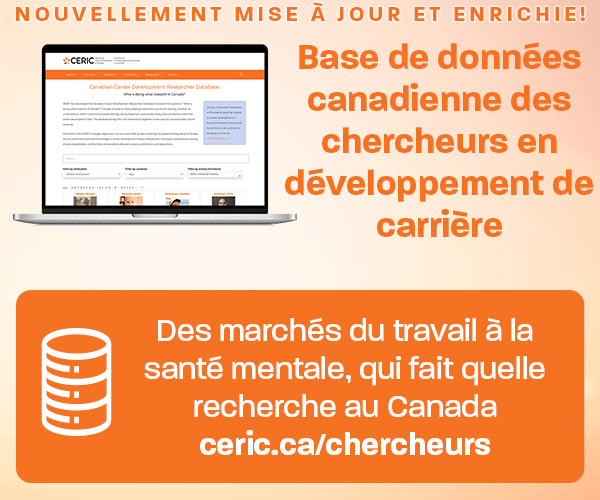Ambitions mondiales, soutien local. Comprendre l'influence du corps professoral sur le développement de carrière des étudiants internationaux
DOI :
https://doi.org/10.53379/cjcd.2025.410Mots-clés :
International Students, Postsecondary, Faculty, social justiceRésumé
Les parcours éducatifs et migratoires des étudiants internationaux occupent une place de plus en plus importante dans le discours public, souvent accompagné de stéréotypes selon lesquels les étudiants sont des travailleurs à bas salaire plutôt que des professionnels en devenir. Toutefois, lorsqu'on se penche sur leurs propres récits, les étudiants étrangers soulignent qu'ils espèrent que les professeurs et les établissements les soutiendront dans la réalisation de leurs aspirations professionnelles. Ces aspirations peuvent également être liées à des permis de travail post-universitaires ou à des projets de migration. Une taxonomie de l'enseignement interculturel centré sur l'étudiant, élaborée dans un établissement postsecondaire de l'Ouest canadien, met en évidence cinq pratiques professorales qui soutiennent le développement de carrière : (1) affirmer les compétences, les connaissances et l'expérience des étudiants ; (2) reconnaître les facteurs non académiques, y compris le travail actuel, dans la vie des étudiants ; (3) soutenir la transition vers le marché du travail ; (4) établir des liens avec les étudiants ; et (5) faire preuve de sensibilité culturelle. Ce réseau de pratiques met en évidence la fonction d'influenceur de carrière du corps enseignant.
En tant qu'influenceurs de carrière, les professeurs peuvent reconnaître les obstacles systémiques auxquels les étudiants sont confrontés dans leur parcours d'éducation et d'immigration, les guider dans la remise en question des récits dominants, les soutenir et les défendre dans la poursuite de carrières professionnelles intéressantes, et servir de défenseurs.
de carrières professionnelles significatives, et servir de défenseurs. Les étudiants étrangers considèrent les enseignants comme des personnes influentes en matière de carrière. Le soutien institutionnel et le développement du corps professoral sont nécessaires pour aider les enseignants à adopter une vision holistique des parcours professionnels des étudiants et à reconnaître leur rôle essentiel d'influenceurs, de guides et de défenseurs.
Références
Arkoudis, S., Yu, X., Baik, C., Borland, H., Chang, S., Lang, I., Lang, J., Pearce, A., & Watty, K. (2010). Finding common ground: Enhancing interaction between domestic and international students. Australian Teaching and Learning Council. http://www.cshe.unimelb.edu.au/research/projectsites/enhancing_interact.html
Arthur, N. (2023). International students: Commodities for education, local employment, and the global labour market. In D. L. Blustein & L. Y. Flores (Eds.), Rethinking Work: Essays on building a better workplace (pp. 67-72). Routledge.
Blustein, D. L., & Flores, L. Y. (Eds.). (2023). Rethinking work: Essays on building a better workplace. Routledge.
Brunner, L. R. (2022). Towards a more just Canadian education-migration system: International student mobility in crisis. Studies in Social Justice, 16(1), 78–102. https://doi.org/10.26522/ssj.v16i1.2685
Canadian Bureau for International Education. (2024). Canadian Bureau for International Education Infographic. https://cbie.ca/infographic/
CERIC, & OneLifeTools. (2022). Unlocking the career development value within experiential learning: Literature search & abstract: Approach, findings and results. CERIC https://ceric.ca/?wpdmdl=53809&ind=1648236907889
Chilisa, B., & Tsheko, G. N. (2014). Mixed methods in Indigenous research: Building relationships for sustainable intervention outcomes. Journal of Mixed Methods Research, 8(3), 222–233. https://doi.org/10.1177/1558689814527878
Choi, Y., Hou, F., & Chan, P. C. W. (2021). Early earnings trajectories of international students after graduation from postsecondary programs. Immigration, Refugees and Citizenship Canada. https://doi.org/10.25318/36280001202100200004-ENG
Choudhury, S. (2021). Deep diversity: A compassionate, scientific approach to achieving racial justice. Greystone Books. https://greystonebooks.com/products/deep-diversity
Creswell, J. (2015). Revisiting mixed methods and advancing scientific practices. In S. N. Hesse-Biber & R. B. Johnson (Eds.), The Oxford handbook of multimethod and mixed methods research inquiry (pp. 57–71). Oxford University Press.
Cooperrider, D. L., & Srivasta, S. (1987). Appreciative Inquiry in organizational life. In R. Woodman & W. Pasmore (Eds.), Research in organizational change and development (Vol. 1, pp. 129–169).
Dimitrov, N., & Haque, A. (2016). Intercultural teaching competence: A multi-disciplinary model for instructor reflection. Intercultural Education, 27(5), 437–456. https://doi.org/10.1080/14675986.2016.1240502
Eberhardt, J. L. (2020). Biased: Uncovering the hidden prejudice that shapes what we see, think, and do. Penguin Books.
Esses, V., Sutter, A., Ortiz, A., Luo, N., Cui, J., & Deacon, L. (2018). Retaining international students in Canada post-graduation: Understanding the motivations and drivers of the decision to stay. Canadian Bureau for International Education. https://cbie.ca/wp-content/uploads/2018/06/Intl-students-post-graduation-RiB-8-EN-1.pdf
Fetters, M. D., Curry, L. A., & Creswell, J. W. (2013). Achieving integration in mixed methods designs: Principles and practices. Health Services Research, 48 (6pt2), 2134–2156. https://doi.org/10.1111/1475-6773.12117
Francis, J. (2023). Study, work, stay? Pathways & outcomes for international students in BC:Reducing the gaps between opportunity and responsibility. Langara College. https://arcabc.ca/islandora/object/lc:5420
Global Affairs Canada. (2019). Building on success: International education strategy 2019-2024. Government of Canada. http://publications.gc.ca/collections/collection_2020/amc-gac/FR5-165-2019-eng.pdf
Government of Canada. (2024). Canada to stabilize growth and decrease number of new international student permits issued to approximately 360,000 for 2024. https://www.canada.ca/en/immigration-refugees-citizenship/news/2024/01/canada-to-stabilize-growth-and-decrease-number-of-new-international-student-permits-issued-to-approximately-360000-for-2024.html
Grant, S., & Humphries, M. (2006). Critical evaluation of appreciative inquiry: Bridging an apparent paradox. Action Research, 4(4), 401–418. https://doi.org/10.1177/1476750306070103
Gyamera, G. O., & Burke, P. J. (2018). Neoliberalism and curriculum in higher education: A post-colonial analyses. Teaching in Higher Education, 23(4), 450–467. https://doi.org/10.1080/13562517.2017.1414782
Henson, R. K., & Roberts, J. K. (2006). Use of exploratory factor analysis in published research: Common errors and some comment on improved practice. Educational and Psychological Measurement, 66(3), 393–416. https://doi.org/10.1177/0013164405282485
Ho, C. (2019). Professionals in post-secondary education: Conceptions of career influence. (Doctoral dissertation, Simon Fraser University, Surrey, Canada). http://summit.sfu.ca/item/18827
Ho, C. (2021). Focus on relationships and strengths: Engaging international learners online. International Teaching Online Symposium. https://scholar.uwindsor.ca/itos21/session4/session4/6/
Ho, C., Stewart-Smith, C., & Gunaratne, D. (2023). How career influencers can promote sustainable careers and the wellbeing of underrepresented students. In W. E. Donald (Ed.), Handbook of research on sustainable career ecosystems for university students and graduates (pp. 407-427). IGI Global. https://doi.org/10.4018/978-1-6684-7442-6
Hooley, T., Sultana, R. G., & Thomsen, R. (Eds.). (2018). Career guidance for social justice: Contesting neoliberalism (1st. ed.). Routledge. https://doi.org/10.4324/9781315110516
Hooley, T., Sultana, R. G., & Thomsen, R. (Eds.). (2019). Career guidance for emancipation: Reclaiming justice for the multitude. Routledge. https://doi.org/10.4324/9781315110486
Hughes, B. L., Camp, N. P., Gomez, J., Natu, V. S., Grill-Spector, K., & Eberhardt, J. L. (2019). Neural adaptation to faces reveals racial outgroup homogeneity effects in early perception. Proceedings of the National Academy of Sciences, 116(29), 14532–14537. https://doi.org/10.1073/pnas.1822084116
IRCC. (2018, April 20). Profile of Canada’s International Student Movement: From Temporary to Permanent Residents. Pathways to Prosperity, Vancouver, BC. http://p2pcanada.ca/wp-content/ blogs.dir/1/files/2018/04/01-Angie-Larocque.pdf
IRCC. (2023, January 17). Post-graduation work permit program – [R205(c)—C43] – International mobility program. Government of Canada. https://www.canada.ca/en/immigration-refugees-citizenship/corporate/publications-manuals/operational-bulletins-manuals/temporary-residents/study-permits/post-graduation-work-permit-program.html
IRCC. (2024, January 22). Canada to stabilize growth and decrease number of new international student permits issued to approximately 360,000 for 2024. Government of Canada. https://www.canada.ca/en/immigration-refugees-citizenship/news/2024/01/canada-to-stabilize-growth-and-decrease-number-of-new-international-student-permits-issued-to-approximately-360000-for-2024.html
Keller, T. (2024, February 2). Here’s a crazy idea: How about a student visa program whose main beneficiary is Canada. The Globe and Mail. https://www.theglobeandmail.com/business/commentary/article-heres-a-crazy-idea-how-about-a-student-visa-program-whose-main/
Killick, D. (2018). Developing intercultural practice: Academic development in a multicultural and globalizing world. Routledge.
Lee, A., Felten, P., Poch, R. K., Solheim, C., & O’Brien, M. K. (2017). Teaching interculturally: A framework for integrating disciplinary knowledge and intercultural development. Stylus Publishing, LLC.
Liamputtong, P. (2011). Focus group methodology: Principles and practices. Sage.
Marom, L. (2023). Market mechanisms’ distortions of higher education: Punjabi international students in Canada. Higher Education, 85(1), 123-140. https://doi.org/10.1007/s10734-022-00825-9
Mertens, D. M. (2007). Transformative paradigm: Mixed methods and social justice. Journal of Mixed Methods Research, 1(3), 212–225. https://doi.org/10.1177/1558689807302811
O’Cathain, A. (2010). Assessing the quality of mixed methods research: Toward a comprehensive framework. In A. Tashakkori & C. Teddlie (Eds.), SAGE Handbook of Mixed Methods in Social & Behavioral Research. SAGE. https://doi.org/10.4135/9781506335193
Onwuegbuzie, A. J., Bustamante, R. M., & Nelson, J. A. (2010). Mixed research as a tool for developing quantitative instruments. Journal of Mixed Methods Research, 4(1), 56–78. https://doi.org/10.1177/1558689809355805
Onwuegbuzie, A. J., Dickinson, W. B., Leech, N. L., & Zoran, A. G. (2009). A qualitative framework for collecting and analyzing data in focus group research. International Journal of Qualitative Methods, 8(3), 1–21. https://doi.org/10.1177/160940690900800301
Redekopp, D. E., & Austen, P. (2015). Community helpers: Program coordinator’s guide. Alberta, BC: Life-Role Development Group Ltd.
Saldaña, J. (2021). The coding manual for qualitative researchers (4th ed). SAGE.
Stebleton, M. J., & Ho, C. (2023). Career development is everyone’s responsibility: Envisioning educators as career influencers. Journal of College and Character, 24(3), 189-196. https://doi.org/10.1080/2194587X.2023.2224577
Steele, C. M. (2010). Whistling Vivaldi: And other clues to how stereotypes affect us. W.W. Norton.
Stein, S., & Andreotti, V. O. (2016). Cash, competition, or charity: International students and the global imaginary. Higher Education, 72(2), 225–239. https://doi.org/10.1007/s10734-015-9949-8
Stein, S., & Andreotti, V. (2017). Higher education and the modern/colonial global imaginary. Cultural Studies & Critical Methodologies, 17(3), 173–181. https://doi.org/10.1177/1532708616672673
Whitney, D. K., & Trosten-Bloom, A. (2010). The power of appreciative inquiry: A practical guide to positive change (2nd ed). Berrett-Koehler Publishers.

Téléchargements
Publié-e
Comment citer
Numéro
Rubrique
Licence
(c) Tous droits réservés La Revue canadienne de développement de carrière 2025

Cette œuvre est sous licence Creative Commons Attribution - Pas d'Utilisation Commerciale - Pas de Modification 4.0 International.











